Page 1 of 1
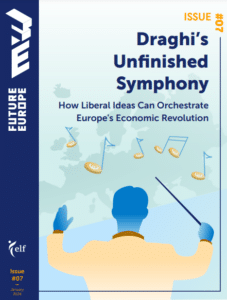
Draghi’s Unfinished Symphony: How Liberal Ideas Can Orchestrate Europe’s Economic Revolution
This Issue of the Future Europe Journal is examining Europe’s competitiveness challenge one year after Mario Draghi’s landmark call for action
- Type: Future Europe Journal,
- Year: 2026
- Language: English,
- Member: ELF Secretariat,

From Algorithms to Ballots: How Social Media and AI Shape Europe’s Political Future
Policy-oriented publication that explores how social media platforms, artificial intelligence, and digital information systems influence political behaviour and electoral processes across Europe.
- Type: Future Europe Journal,
- Year: 2025
- Language: English,
- Member: Boris Divkovic Foundation, Projekt:Polska,
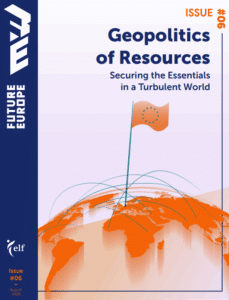
[FEU Journal 6] Geopolitics of Resources- Securing the Essentials in a Turbulent World
This issue of Future Europe examines the four key pillars of resource security: energy and raw materials, strategic industries, workforce and demographics, and external relations. Through expert analysis and concrete policy recommendations, the journal outlines how Europe can safeguard essential resources while seizing the opportunity to advance its global role. The message is clear: with unity and foresight, the EU can emerge from today’s pressures stronger, more self-reliant, and better equipped to lead in a changing world.
- Type: Future Europe Journal, Publication,
- Year: 2025
- Language: English,
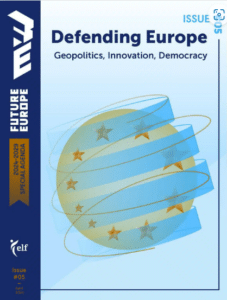
[FEU Journal 5] Defending Europe: Geopolitics, Innovation, Democracy
Future Europe Journal Issue 4 is out and it delves into the multifaceted importance of European cultural and creative industries.
- Type: Future Europe Journal,
- Year: 2024
- Member: ELF Secretariat,
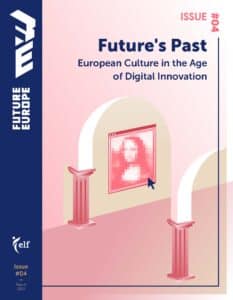
[FEU Journal 4] Future’s Past: European Culture in the Age of Digital Innovation
Future Europe Journal Issue 4 is out and it delves into the multifaceted importance of European cultural and creative industries.
- Type: Future Europe Journal,
- Year: 2024
- Member: ELF Secretariat,
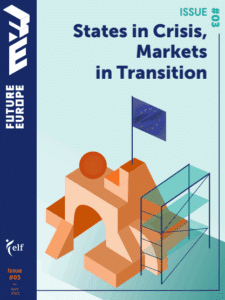
[FEU Journal 3] States in Crisis Markets in Transition
The third issue of the Future Europe Journal is dedicated to exploring how Europe has been transitioning to new modes of functioning due to its multifaceted crisis management. In their contributions, our authors reflect on two interrelated dynamics. On the one hand, the papers study how the European markets and industries adapted to new challenges and demands. On the other hand, the authors focus on innovative instruments and practices that policymakers could utilise to navigate crises and out-of-the-ordinary scenarios on the EU level. Both angles shed light on the long-term transformations and trajectories to which the European states, markets, and the Union as a whole are heading.
- Type: Future Europe Journal, Publication,
- Year: 2023
- Language: English,
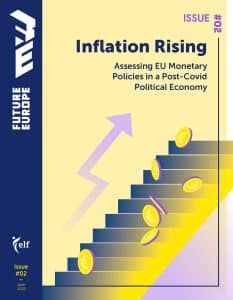
[FEU Journal 2] Future Europe Journal: Inflation Rising
Assessing EU Monetary Policies in a Post-Covid Political Economy
- Type: Future Europe Journal,
- Year: 2022
- Member: ELF Secretariat,
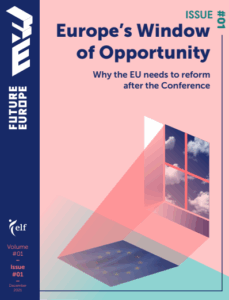
[FEU Journal 1] Europe’s Window of Opportunity
This journal fills a gap that we believe exists between academia, policymaking,
and the wider public. European Studies as an academic field has experienced
a formidable boom in recent decades. This has led to a number of crucial
insights into the development of the European project, its strengths and
weaknesses, and ways to address them. Yet these are not always considered
by policymakers and indeed are often unknown beyond specialised circles.
At the same time, academics sometimes tend to stay too long in their ivory
towers and could benefit from the practical knowledge of those involved
in the day-to-day business of making Europe and from getting a better
grip on the wishes and aspirations of its citizens. This is this dialogue that
Future Europe wants to foster.
- Type: Future Europe Journal,
- Year: 2021
- Language: English,
Page 1 of 1